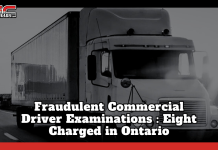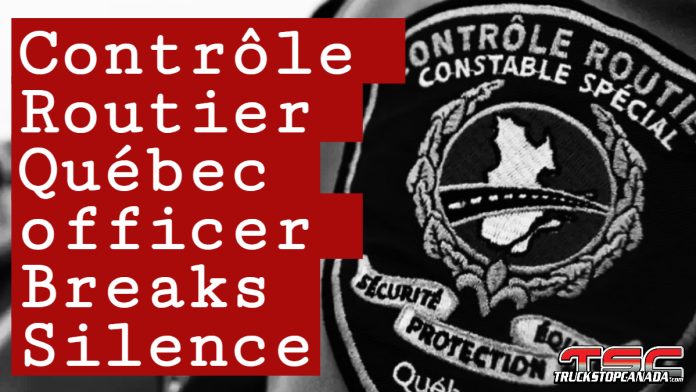For over three months, Contrôle routier Québec officers—Quebec’s designated peace officers for enforcing road safety regulations in the commercial transport sector—have been removed from patrol duties following a landmark ruling by the Administrative Labour Tribunal (TAT). Now restricted to fixed checkpoints, these officers can no longer fulfill the majority of their mandate.
An anonymous open letter, signed by a member of the Fraternité des constables du contrôle routier du Québec (FCCRQ), was sent to us along with supporting documents. It denounces a critical situation with serious consequences for public safety, the transportation industry, and governance.
“As Contrôle routier Québec officers, we have completely lost confidence in our leadership, particularly those tied to the SAAQ. This breakdown of trust was so profound that, within weeks of the TAT ruling, our union—the FCCRQ—formally requested that Contrôle routier Québec be placed under trusteeship, addressing this directly to Minister Guilbault. This exceptional move, prompted by a blatant failure of governance, remains unanswered, highlighting the lack of consideration given to a major public safety crisis.”
“This letter aims to alert both the public and decision-makers to the urgency of resolving a crisis that jeopardizes not only our safety, but that of all Quebec road users and the integrity of our critical infrastructure.”
Crisis in Governance: SAAQclic, Trusteeship and Ministerial Silence
The letter draws a direct link between the failure of the SAAQclic system and the current crisis facing Contrôle routier Québec officers. Originally intended to modernize services, the digital system caused internal chaos, cost overruns, and a collapse of trust—both among staff and the general public.
For many, the SAAQ has become a symbol of disconnected, opaque management, damaging the credibility of those tasked with enforcing authority on the ground. In this climate, Contrôle routier Québec officers struggle to carry out their duties while being attached to a public institution whose image has been deeply tarnished.
Meanwhile, the SAAQ has chosen to challenge the TAT ruling in court instead of addressing the concerns outlined in the judgment. The Tribunal had concluded that controllers faced real dangers while on duty, citing 27 violations related to occupational health and safety—from inadequate equipment to the inability to protect their physical and mental wellbeing. Judge Danielle Tremblay ordered the immediate cessation of these dangerous conditions. Yet the SAAQ opted for legal battles over preventative action, leaving thousands of kilometers of roads without mobile enforcement.
This decision has only deepened the perception among many officers that their employer refuses to listen to its own personnel and disregards their safety. The situation raises broader questions about whether Contrôle routier Québec should be managed by a different ministry, one better equipped to oversee a peace officer corps rather than an overloaded and dysfunctional administrative agency.
Peace Officers Without Weapons: A Misunderstood Role
Contrôle routier Québec officers are recognized peace officers and special constables under their official mandate. They are empowered to act not only under the Highway Safety Code but also the Criminal Code, dealing with impaired driving, theft, and drug transport. Their 21-week training at the École nationale de police covers both road enforcement and criminal investigations.
“Over the years, our role has evolved significantly. As Mr. Daignault noted, ‘We deal with criminal matters, drug trafficking, stolen vehicles. The work environment has shifted dramatically over the past 10 years.'”
Despite their expanded duties and police-level training, these officers work with minimal tools—a baton and pepper spray—leaving them exposed to risks typically faced by armed police. At the same time, SAAQ’s failings and legal choices have increased public confusion. Controllers are increasingly perceived as mere ticket issuers or disgruntled union members, a stark contrast to their true mission of public safety.
“Carrying appropriate defensive equipment is not an excessive demand; it’s a necessity dictated by the evolving nature of our work and our legal duty to intervene in criminal acts. As the TAT recognized, our intervention techniques assume access to tools fit for critical incidents.”
“Integration into the Ministry of Public Security would fully acknowledge the nature of our work, which aligns far more with public safety than administrative transport management. This demand echoes Recommendation 94 of the Police Reality Advisory Committee, mandated by Minister Guilbault.”
“These concerns are shared by many organizations, including the FTQ, and transportation industry associations such as the ACQ and ANCAI, who all recognize our vital role in ensuring public safety.”
What Contrôle routier Québec No Longer Monitors
Since Contrôle routier Québec officers were pulled from patrol, several types of vehicles are no longer subject to oversight. School buses, coaches, taxis, Uber vehicles, and heavy machinery like tractors and excavators now go unchecked.
School zones and construction sites, previously monitored with speed radar by these officers, are now left without coverage, posing direct risks to children and road workers.
Critical infrastructure is also at risk. Without mobile inspections, overweight trucks are circulating unchecked, potentially damaging already vulnerable roads, bridges, and tunnels. The Louis-Hippolyte-La Fontaine Tunnel, the Île-aux-Tourtes Bridge, and many regional secondary roads are particularly exposed. According to the letter, the absence of enforcement accelerates premature infrastructure decay. One single overweight truck, it notes, can inflict as much damage as thousands of compliant vehicles.
The trucking industry has not been spared. With no mobile enforcement, trucks avoiding weigh stations face little risk. Yet many may be operating with major mechanical issues, underqualified drivers, or even illicit cargo. While police can intervene, Contrôle routier Québec officers are specifically trained and mandated for these inspections.
A Call to Immediate Action
“Contrôle routier Québec officers deserve to be treated with the respect due to their status as peace officers and special constables, and to be equipped with the tools needed to carry out their mission safely.”
“Therefore, I call upon:
The Government of Quebec to accelerate the implementation of real solutions to allow the safe return of road controllers to patrol duties;
The Ministers of Transport and Public Security to take a public stance on the future of Contrôle routier Québec and to act on the Police Reality Advisory Committee’s recommendation regarding their status;
The SAAQ to acknowledge the legitimacy of the safety concerns raised by Contrôle routier Québec officers and to cooperate in resolving the situation rather than pursue legal challenges to the TAT ruling;
Municipalities to pressure the government to restore patrol coverage and the specialized services they regularly relied upon;
Media organizations to pay close attention to this critical issue, which affects the safety of all road users.”
This anonymous letter echoes widespread concerns in the road transport industry. The lack of oversight, confusion over Contrôle routier Québec’s mandate, and broader issues of governance all raise serious questions about the current state of road safety in Quebec. Without a clear response from authorities, some fear the situation will continue to deteriorate—until a serious incident once again forces us to confront the consequences of a broken system.
Note : The quotations included in this article were translated from French to English to the best of our understanding and with the utmost care to preserve their original meaning.
Read More :
No Patrolling by Contrôle Routier Québec’s Agents on Highways Until 2026?














